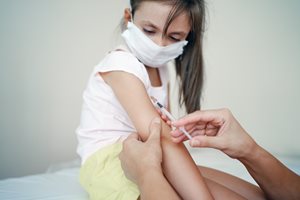Also known as: vaccinations, booster shots, immunizations.
 Keeping children up-to-date on their immunizations is important for both their health and the health of our community. In recent years, we have seen pediatric outbreaks of diseases for which vaccines are available, and part of CDC-recommended vaccinations such as measles, mumps and rubella (MMR).
Keeping children up-to-date on their immunizations is important for both their health and the health of our community. In recent years, we have seen pediatric outbreaks of diseases for which vaccines are available, and part of CDC-recommended vaccinations such as measles, mumps and rubella (MMR).
What are vaccinations?
Vaccinations are doses of dead or weakened viruses, bacteria or other organisms that provide the body with protection from developing the illness related to the organism later in life. Many are given early in life to protect children from dangerous illnesses, but others are given annually (such as the flu vaccine) or later in life.
Why are vaccinations and immunizations important?
Maintaining a regular vaccination schedule protects your child and our communities from preventable diseases and outbreaks.
What is the safety of vaccines?
Vaccines undergo a rigorous testing process often for years before they are administered to the public.
At what age should my child receive immunizations?
The best resource for your child’s proper immunization schedule is your pediatrician. You may also refer to the CDC’s website for Recommended Vaccinations for Children, which provides a comprehensive vaccine schedule by age.
What are some tips for the day of vaccination and immunization?
How you prepare your child will vary depending on their age and maturity.
- The CDC recommends for babies and young children, to comfort your child by cuddling or singing. Bring their favorite toy, blanket or book, and hold your child firmly while vaccines are being administered.
- For older children and adolescents, maintain friendly and supportive conversation and normalize vaccines as much as possible. Avoid scolding a child for crying or “not being brave” as everyone’s pain tolerance varies.
How can I make sure my child’s vaccines and immunizations are up to date?
Your child’s pediatrician is the best resource for maintaining your child’s vaccination schedule since they follow CDC guidelines for pediatric vaccination and immunizations.
What are the common vaccine preventable diseases?
Below is a list of vaccine-preventable diseases:
For more information, please visit the CDC’s website for Recommended Vaccinations for Children.
Reviewed by: Maria Milla, MD
This page was last updated on: January 20, 2021 09:11 AM
January 20, 2021 – Children with diabetes are more likely to experience complications from the flu that can lead to hospitalization. They also need extra protection against pneumonia and meningitis.
Related Videos
Maria Milla, MD, FAAP, is a board-certified pediatrician with Nicklaus Children's Hospital in Miami and section chief for Nicklaus Children's Pediatric Care Centers. Dr. Milla explains why it is specially important for your child's vaccination schedule to be up to date during a pandemic.